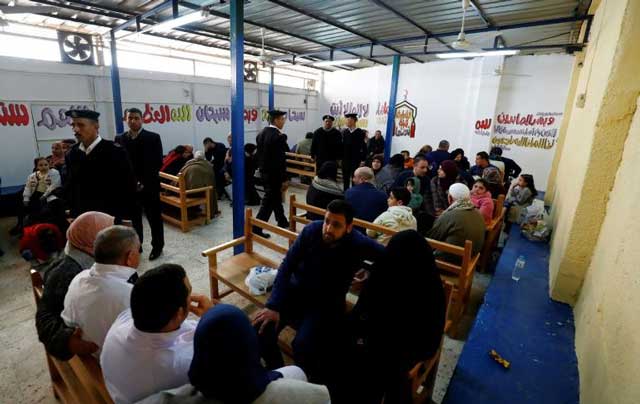
Cairo, Egypt | AFP | In Egypt’s overcrowded and putrid jails, families of prisoners fear a potentially catastrophic coronavirus outbreak and are calling for their imminent release as the rest of the country hunkers down.
Egypt has halted family visits to inmates at least until the end of this month citing the “public health and safety of inmates”.
This has meant relatives cannot bring medicine, clean clothes and fresh food directly to those incarcerated.
For Ekram Yousef, a well-known writer and mother of lawyer and former lawmaker Zyad al-Elaimy whose health is slowly failing, the anguish is palpable.
“My son has diabetes, high blood pressure, ulcers and most of all a niggling respiratory disease,” she told AFP, anxious that he is at a high risk of contracting the coronavirus.
“There are no phone calls so I have to guess which medicines he is running out of.”
The 40-year-old, a key figure in the 2011 revolution, was jailed in June last year and is awaiting trial for promoting “unrest against the state”.
He was also sentenced last week to one year in prison in another case for “broadcasting false news” for comments he made in a BBC interview.
“We have a feeling of extreme helplessness,” his mother said.
“What are the priorities with this pandemic: should we continue punishing people or take care of the health of the population at large?” Yousef asked.
She suggested, as proposed by groups such as Human Rights Watch, a conditional release for prisoners of conscience and those who do not pose a threat to society.
AFP tried to contact the head of Egypt’s prison authority for a comment but he was unavailable.
– ‘Clusters for disease’ –
Prisoners have described harrowing conditions behind bars, of a lack of blankets, sleeping on the floor, filthy toilets and a limited amount of medication.
Last June, former president Mohamed Morsi himself died after collapsing in court, sparking a global outcry about medical negligence in Egyptian jails.
UN special rapporteur Agnes Callamard described his death as a “state-sanctioned arbitrary killing”.
On Wednesday, Egyptian police detained four prominent women dissidents after they demanded the release of prisoners over coronavirus fears.
The activists — scientist Mona Seif, her mother Laila, a mathematics professor, her Booker Prize shortlisted novelist aunt Ahdaf Soueif as well as American University in Cairo professor Rabab al-Mahdi — held a small demonstration in central Cairo.
“We are in front of the cabinet building, asking for the state to take serious steps regarding coronavirus in prisons. As we know, at the best of times Egypt’s prisons are clusters for disease,” Mona Seif said in a live Facebook video before her arrest.
They were all freed by late Thursday after their families and lawyers advocated for their release.
On social media, Egyptians have started campaigns using the hashtag #LetthePrisonersOut and petitions gathering thousands of signatures.
A few opposition lawmakers in parliament have also joined calls to free inmates for humanitarian reasons.
Amnesty International on Friday said that the spread of coronavirus in Egypt’s prisons should prompt the authorities to “immediately and unconditionally release all activists and human rights defenders”.
– ‘Desperate and powerless’ –
In contrast to Iran which freed 85,000 prisoners this month, including scores of political detainees, Egyptian authorities have resolutely kept inmates locked up even as the state imposes measures to limit social interactions.
Egypt has so far recorded six deaths and 256 confirmed COVID-19 cases.
The country’s total prison population numbers around 106,000, including 60,000 political prisoners, according to the Arab Network for Human Rights Information.
President Abdel Fattah al-Sisi has denied Egypt is holding any political detainee.
Hoda Abdel-Moneim, a 61-year-old respected lawyer who has been in solitary confinement since November 2018, suffers from high blood pressure and has sustained a clot in her left leg.
Her Brussels-based daughter Jihad Khaled told AFP that her mother has been previously denied medication for over three months.
There are no specialist doctors who can cater to her medical needs in the rudimentary hospital in Qanater Women’s Prison, Khaled said.
“The whole jail will be infected even if there’s one case coming from the outside — it could be anyone who works in the prison,” she explained.
With authorities also halting court hearings as part of nationwide measures to stem the virus spreading in Egypt, Abdel-Moneim’s time in jail is now prolonged.
“And with quarantine imposed, there’s no way for her to come out of her cell for some sun and air.”
French national Celine Lebrun’s activist husband Ramy Shaath remains in detention battling various ailments including a stomach ulcer and high cholesterol.
Shaath, 48, is a son of former interim Palestinian prime minister and Oslo peace negotiator Nabil Shaath.
Lebrun said her husband shares a 25 square metre (270 sq foot) cell with 18 other men where the “sanitary conditions are miserable even by the government’s own account”.
“I’m feeling desperate and powerless that the health of my husband is in the hands of his jailers,” she said.
 The Independent Uganda: You get the Truth we Pay the Price
The Independent Uganda: You get the Truth we Pay the Price



